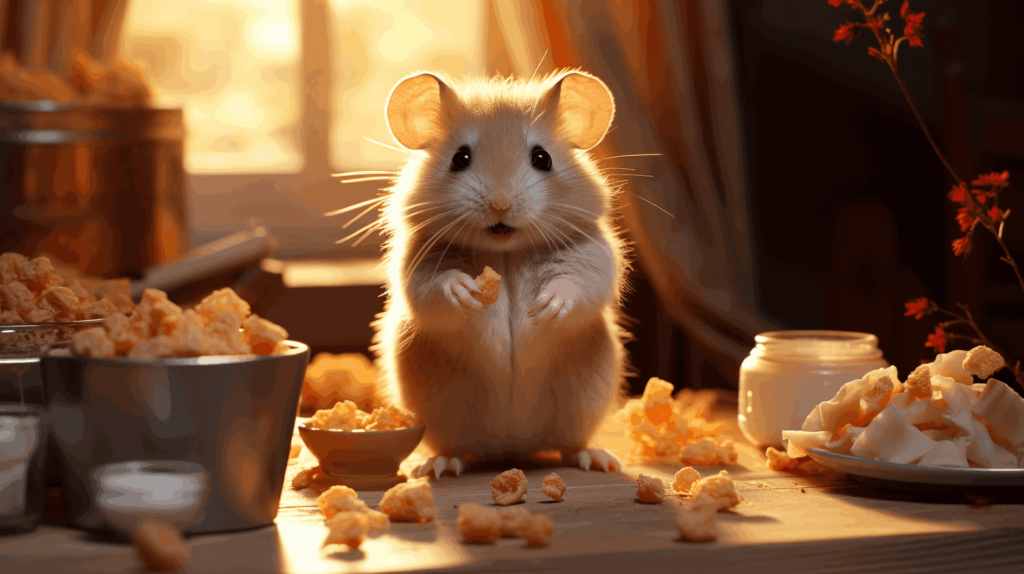Discover the truth about whether guinea pigs can safely indulge in the beloved snack of popcorn. While seemingly harmless, popcorn may pose potential risks to our furry friends.
In this article, we delve into the nutritional aspects of popcorn, its impact on guinea pigs’ delicate digestive systems, and the potential dangers it may present.
By examining reliable sources and expert opinions, we aim to provide a comprehensive understanding of whether popcorn should be included in a guinea pig’s diet.
Key Takeaways
- Guinea pigs have sensitive and delicate digestive systems.
- Feeding popcorn to guinea pigs can lead to digestive issues like diarrhea and constipation.
- Popcorn offers no nutritional benefit for guinea pigs.
- Maintaining a suitable diet, including vegetables, plant-based pellets, hay, and grass, is crucial for preventing gastrointestinal problems in guinea pigs.
Popcorn as a New Snack Option
One potential alternative snack option for guinea pigs is popcorn, which can add variety to their diet and be given in small quantities as a treat. Guinea pigs typically have a plant-based diet consisting of vegetables, plant-based pellets, high-quality hay, and grass.
Introducing popcorn as an occasional snack can give guinea pigs a different texture and flavor experience. However, it is essential to note that popcorn should only be provided in small quantities and as an occasional treat due to its high fat and calorie content.
Guinea pigs have delicate and sensitive digestive systems, and consuming excessive popcorn can lead to digestive issues like constipation and diarrhea. Therefore, while popcorn can offer some variety to a guinea pig’s diet, it should be given with caution and in moderation.
Guinea Pigs’ Plant-Based Diet
Occasionally, guinea pigs thrive on a plant-based diet consisting of vegetables, plant-based pellets, high-quality hay, and grass. This diet provides the vitamins, minerals, and fiber guinea pigs need to stay healthy.
Vegetables such as carrots, bell peppers, and leafy greens are essential sources of nutrients for guinea pigs. Plant-based pellets should be a staple in their diet, formulated to meet their nutritional needs.
High-quality hay and grass are essential for proper digestion and dental health. It is important to note that guinea pigs have delicate digestive systems, and certain foods, such as popcorn, should be avoided. Popcorn is high in fat and calories and can cause digestive issues in guinea pigs.
Therefore, sticking to a plant-based diet designed explicitly for their needs is best.
High Fat and Calorie Content of Popcorn
Given popcorn’s high fat and calorie content, it is essential to avoid giving it to guinea pigs as it can lead to digestive issues and potential health risks.
- Popcorn is high in fat and calories, which can cause sickness, dehydration, and constipation in guinea pigs.
- Guinea pigs have delicate and sensitive digestive systems that cannot digest popcorn like humans.
- Most popcorn brands do not offer any nutritional benefits for guinea pigs.
Instead, guinea pigs should consume a plant-based diet consisting of vegetables for vitamins and minerals, high-quality hay and grass for digestion and dental health, and plant-based pellets for their daily diet. Root vegetables can be given in small quantities as a treat.
It is essential to prioritize the well-being and health of guinea pigs by providing them with a suitable and balanced diet.
Potential Health Risks for Guinea Pigs
The potential health risks for guinea pigs should be carefully considered before introducing new food into their diet. While guinea pigs have a plant-based diet, not all foods humans can eat are safe.
Popcorn, for example, can pose several dangers to guinea pigs. Firstly, guinea pigs cannot digest popcorn like humans, which is high in fat and calories. Consuming popcorn can lead to sickness, dehydration, and constipation in guinea pigs. Additionally, popcorn can cause choking and digestive issues in guinea pigs with delicate and sensitive digestive systems.
It is crucial to prioritize the well-being of guinea pigs and provide them with a balanced diet of vegetables, plant-based pellets, high-quality hay, and grass. Root vegetables can be given as occasional treats in small quantities.
Choking Hazard of Popcorn
What are the potential dangers associated with the choking hazard of popcorn for guinea pigs?
- Popcorn can cause guinea pigs to choke.
- Guinea pigs have delicate and sensitive digestive systems.
- Popcorn can lead to digestive issues in guinea pigs.
- Diarrhea, stomach pain, and gastrointestinal issues can occur.
- Popcorn is high in fat and calories.
- Most popcorn brands do not offer any nutritional benefits.
- Giving popcorn to guinea pigs is not worth the risk.
Guinea pigs should consume vegetables for vitamins and minerals, plant-based pellets for their daily diet, and high-quality hay and grass for digestion and dental health. Root vegetables can be given in small quantities as a treat. It is essential to consider the specific dietary needs of guinea pigs and avoid giving them foods that can cause harm.
Sources:
- Pet Consortium: ‘Can Guinea Pigs Eat Popcorns?’
- RSPCA: ‘Guinea Pigs – Diet’
- Petliness: ‘Can Guinea Pigs Eat Popcorn?’
These sources provide information on the topic of guinea pigs and popcorn.
Digestive Issues in Guinea Pigs
Guinea pigs with digestive issues may experience discomfort and require specialized care to alleviate their symptoms. Digestive issues in guinea pigs can arise from various factors, including improper diet, stress, or underlying health conditions. Common symptoms of digestive problems in guinea pigs may include diarrhea, bloating, loss of appetite, and weight loss.
To address these issues, providing a balanced and appropriate diet consisting of high-quality hay, fresh vegetables, and limited amounts of fortified pellets is essential. Additionally, offering probiotics and digestive enzymes specifically formulated for guinea pigs can help improve gut health.
Regular veterinary check-ups are crucial to identify and treat any underlying medical conditions contributing to digestive problems. Guinea pigs with digestive issues can experience relief and enjoy a healthy, comfortable life with proper care and attention.
Delicate Digestive Systems of Guinea Pigs
Delicate care is required to maintain the digestive health of guinea pigs. These small animals have sensitive and tender digestive systems that can easily be disrupted by improper diet or feeding practices.
To ensure their digestive health, guinea pigs require a balanced diet consisting mainly of vegetables, plant-based pellets, high-quality hay, and grass. These provide essential nutrients fiber, and aid in digestion and dental health.
It is important to avoid feeding guinea pigs foods such as popcorn that could harm their digestive system. Popcorn is high in fat and calories, difficult for guinea pigs to digest, and can lead to digestive issues, including diarrhea and constipation.
It is crucial to prioritize the well-being of guinea pigs by providing them with a suitable diet and avoiding risky foods like popcorn.
Diarrhea and Gastrointestinal Problems
Many guinea pigs may experience diarrhea and gastrointestinal problems if fed inappropriate foods, such as popcorn. Guinea pigs have delicate and sensitive digestive systems not designed to digest food like humans. Popcorn, high in fat and calories, can cause sickness, dehydration, and constipation in guinea pigs. Moreover, most popcorn brands do not offer any nutritional benefits for these small animals.
To maintain the health and well-being of guinea pigs, providing them with a suitable diet is essential. Their diet should primarily consist of vegetables for vitamins and minerals, plant-based pellets for daily nutrition, and high-quality hay and grass for digestion and dental health. Root vegetables can be given in small quantities as a treat.
Recommended Diet for Guinea Pigs
A well-balanced and nutritionally rich diet is crucial for maintaining guinea pigs’ optimal health and vitality. The recommended diet for guinea pigs consists of vegetables for vitamins and minerals, plant-based pellets for their daily nutrition, and high-quality hay and grass for digestion and dental health.
Root vegetables can also be given in small quantities as a treat. It is essential to avoid giving guinea pigs popcorn as it can cause digestive issues, such as constipation and diarrhea, due to their delicate and sensitive digestive systems. Popcorn is high in fat and calories and offers no nutritional benefit to guinea pigs. Additionally, popcorn can pose a choking hazard.
Therefore, it is best to stick to a diet specifically designed to meet the nutritional needs of guinea pigs.
Conclusion
In conclusion, while popcorn may be a popular snack for humans, it is unsuitable for guinea pigs.
Guinea pigs have delicate digestive systems and a plant-based diet, making popcorn with its high fat and calorie content potentially harmful to their health.
Additionally, popcorn poses a choking hazard and can lead to digestive issues such as diarrhea in guinea pigs.
It is essential to provide guinea pigs with a recommended diet that meets their specific nutritional needs.


